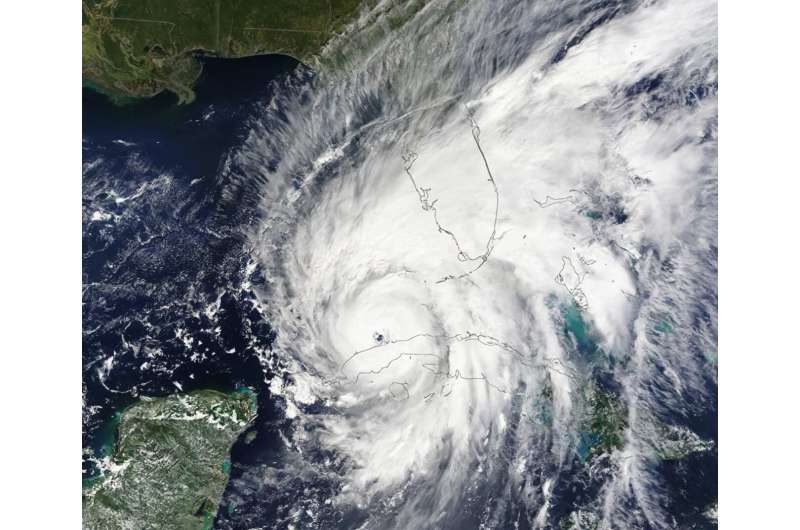This article has been reviewed according to Science X's editorial process and policies. Editors have highlighted the following attributes while ensuring the content's credibility:
fact-checked
trusted source
proofread
Scientists call for real-time analysis of tropical cyclones in the context of climate change

The need for quick and "real-time" forecasting of tropical cyclones is more necessary than ever given the impact of climate change on rainfall amounts. Two climate scientists who believe this take the notion further by suggesting a storyline case study of Hurricane Ian in 2022 can be used as a blueprint for rapid operational climate change attribution statements about extreme storms.
Their premise is detailed in a paper published in the journal Environmental Research: Climate.
Co-authors Kevin A. Reed, Ph.D., Professor and Associate Dean of Research in the School of Marine and Atmospheric Sciences at Stony Brook University, and Michael F. Wehner, Ph.D., of the Lawrence Berkeley National Laboratory in California, note that tropical cyclones such as Hurricane Ian are devastating events worldwide, endangering lives and causing damage costing billions of dollars to repair. Therefore, the public, media, and governmental leaders affected by such extreme storms turn to scientists to understand more about the weather event and how climate change may have affected it.
In the article "Real-time attribution of the influence of climate change on extreme weather events: A storyline case study of Hurricane Ian rainfall," the authors point out that previously it has taken months or even years after extreme storms for scientific studies to supply results on how such storms were impacted by climate change. Their work shifts this paradigm by providing a tropical cyclone rainfall rapid attribution methodology designed for use by operational climate change attribution centers.
Hurricane Ian made landfall in Florida on September 22, 2022. While the storm was still over Florida, Reed and Wehner used social media to alert the public that climate change increased Ian's total rainfall by at least 10%. They also further informed the public and officials of this phenomenon, along with the media, via their quick scientific work during and in the immediate aftermath of the storm.
Their initial statement was a deliberately conservative lower bound given the brief period of time available for analysis. Subsequent analysis supports the published "best estimate" of the precipitation increase due to human induced climate of 18%.
Using a previously developed and tested hindcast attribution methodology in near real-time, the researchers demonstrated that Ian storyline rapid assessments of tropical cyclones can be completed during extreme storms. The authors state that "such rapid assessment offers scientists a useful tool in answering questions about the climate change effect on individual extreme weather events as they unfold."
"Hurricane Ian was an ideal candidate for this type of imposed global warming framework as we were able to complete our simulations and analysis of it because its path was fairly predictable," Reed explains. "This is not always the case as simulated paths of certain storms, such as Superstorm Sandy, are extremely sensitive to weather perturbations. But regardless, we need more attribution statements on how extreme storms are being affected by climate change and provide them to the public quickly."
The authors further point out that storyline attribution methods can be useful when traditional event attribution methods are not tractable. This is particularly the case in developing nations where the high quality long time weather observations necessary for traditional climate change attribution may not be available but weather forecasts demonstrate adequate skill. This capability can then inform decision makers in future loss and damage negotiations.
More information: Kevin A Reed et al, Real-time attribution of the influence of climate change on extreme weather events: a storyline case study of Hurricane Ian rainfall, Environmental Research: Climate (2023). DOI: 10.1088/2752-5295/acfd4e
Provided by Stony Brook University



















